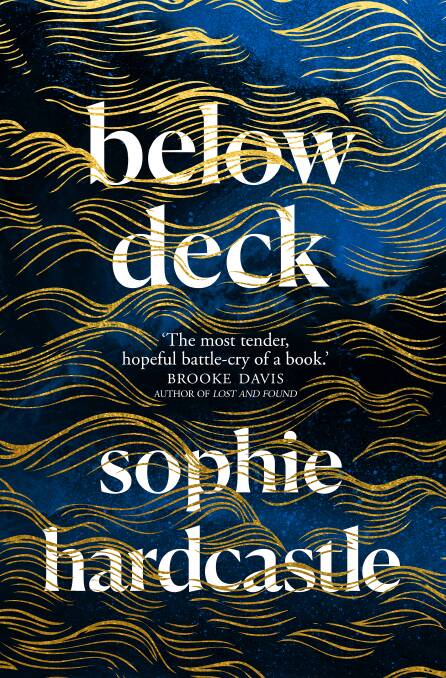
- Below Deck, by Sophie Hardcastle. Allen & Unwin. $29.
There are many reasons to read literature. For some, it is an escape. For some, beautiful language is a drug. For some, it is an opportunity to spend time walking in the shoes of people they might not otherwise meet.
Subscribe now for unlimited access.
$0/
(min cost $0)
or signup to continue reading
And then there are those who want to learn, to think differently, to become better people. Of course, reading is usually a combination of those reasons and depends on the novel in question and the circumstances of the reader. In any case, good novels do many things at once; complexity is their raison d'etre.
Below Deck is the new novel by Australian writer and scholar Sophie Hardcastle, who is the author of Running Like China, a memoir, and her debut novel Breathing Under Water.
On first blush, Below Deck is a novel in four parts about art and sailing, which some may consider a strange combination but Hardcastle weaves the two seamlessly.
Her protagonist is Olivia, or Oli, who we first meet as she wakes in Sydney on a stranger's yacht after a night gone wrong. Although at first thinking she has been kidnapped, Oli has in fact been rescued by a sea-loving man called Mac.
Initially the most striking characteristic of Oli is that she experiences the world through colour: "At first, Mac is grey slate. Cool and hard. But then he laughs and the slate ripples. I see then that he is impossibly deep, like dark ocean. Inky stories twist in him like sea serpents in underwater caves."
Mac becomes both a friend and a father-figure to Oli, who is estranged from her aloof and mostly uncaring parents. Soon he introduces Oli to his friend Maggie, who earlier in life was an art curator of vision and repute; she once arranged an all-female exhibition, though no one bothered to see it.
A number of dramatic factors get the narrative moving during the opening chapters: Oli's grandfather, with whom she is living, dies suddenly (potentially of sadness); Oli, who has recently finished her economics degree, is not sure if she should accept an internship with a prominent bank; and her relationship with her boyfriend Adam, an unimaginative careerist, is clearly on shaky ground.

Adam is a lively presence in the early pages, but he is also a dreadful presence. He is emotionally limited; when Oli tells him that her grandfather has died, he suggests that at least Oli was not close to the man, completely misreading the situation. When Oli needs love and affection, he sets a bath with candles, but then: "Adam turns his head so that we're both looking at ourselves. He grins and tells me we're a hot couple. And then he looks down at my body and whispers in my ear, 'You're so sexy.'"
To Adam, and the many men just like him, a woman is an object, and someone to be controlled, perhaps subtly but near-constantly.
Thankfully Mac and Maggie offer Oli guidance and escape. Which leads the reader to the second part of the novel: "Sea Monsters". A few years have passed and although Oli is now an experienced and confident sailor, she ends up as a cook for a group of men.
Here the narrative turns both horrendous and gut-wrenching. Hardcastle portrays these men as typical alphas: arrogant and entirely unreconstructed, they compete with each other while competing for the attention of Oli.
Despite the dire situation of her protagonist, there is a fearlessness to Hardcastle's writing. She gives the yacht crew no redeeming features.
While Adam didn't really know how to treat Oli, he did love her; but these men, all of whom, deplorably, seem familiar, only have domination on their minds, and Oli suffers at their hands - physically, mentally, and emotionally.
Oh, how the reader longs to put Oli back in the boat with Mac and Maggie.
Thankfully time passes and Oli is now in London. While working as a curator, she forms a relationship with Hugo, a sensitive, thoughtful, and intelligent man. Hugo provides a welcome contrast to the men in the previous section.
There is affection, almost visceral tenderness between Oli and Hugo, and these sequences are superbly rendered with love and warmth. It would give too much of the plot away to reveal what happens next, but there are more twists and turns for Oli.
Below Deck is an achievement of considerable power, not the least because of its ability to balance so many elements of the literary craft.
The writing is poetic yet accessible - remarkably, it is a quick read. The story is harrowing yet human. The characters, even the minor ones, are alive on the page, yet are serving Hardcastle's higher purpose, which is very definitely a political one.
Sophie Hardcastle has the ability to shift the perceptions of her readers, even - especially - her male ones. What a gift.
- Nigel Featherstone's the author of the novel Bodies of Men.

